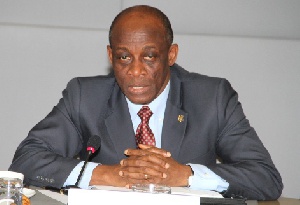Government’s revenue from import taxes has fallen short of expectations for the fourth consecutive year, amid a slowdown in import trade following the introduction of an avalanche of import duties that have been met with disgust by traders.
Data from the Finance Ministry show that import taxes collected between January and November last year amounted to GH¢2.71billion, which is about nine percent below government’s target.
The last time the country exceeded its expectation on import duties was in 2011, when it got GH¢161.8million more than the GH¢1.34billion it had budgeted.
But a Ministry of Finance official, who declined to be named since he is not authorised to talk to the media, is confident the target on import taxes can be met when figures for the last month of last year are compiled; since the ministry expected import trade to rise due to the Christmas celebration.
Even so, figures from the Bank of Ghana show that the total value of import trade for the entire 2015 was US$14billion, which is US$500million short of what was recorded in 2014 -- a year the country’s import revenue reached US$2.77billion, the highest in half a decade.
The fall in government’s import tax revenue has coincided with an astronomical rise in import exemptions, which has become a growing concern for the country’s managers and its external economic advisors.
According to government’s fiscal figures, the value of import duties granted exemptions for the first 11 months of 2015 exceeded the GH¢679.8million government had planned for the period by more than a GH¢1.3billion.
The International Monetary Fund (IMF), which is overseeing the implementation of a three-year Extended Credit Facility Programme for Ghana, has raised questions about the country’s import exemption regime and asked government to overhaul it since it is affecting government’s revenue base.
But some traders have argued the fall in the government import tax revenue has got more to do with the country’s tax regime, as they contend several taxes imposed on imported goods by the government have affected their ability to trade -- which the Ghana Importers and Exporters Association claim could be worsened this year with the onset of Common External Tariffs implementation.
Common External Tariffs have been adopted by member-states of ECOWAS as an effective instrument for harmonising their import policies to guarantee and strengthen the framework for realising a common market.
The start of Common External Tariffs on Monday has seen import charges on a significant number of goods go up; with import taxes on cars, for instance, increasing from five percent of the car’s value to 10 percent.
According to Customs officials in the ECOWAS region, the new tariff regime is aimed at steering demand toward local products.
But the import traders, led by the Ghana Importers and Exporters Association, are downbeat as they believe the new tariff regime will negatively impact on their business -- since the economy is still reeling from years of economic turmoil following the energy supply crisis and uncertainty in the foreign exchange market.
Business News of Wednesday, 3 February 2016
Source: B&FT Online

















